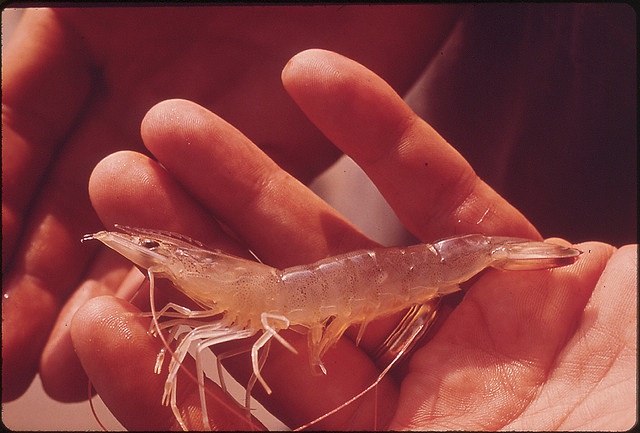“Do shrimps make good mothers? Yes, they do.” This is such a weird line. It feels like the turn in a sonnet that isn’t a sonnet, more specifically known as Denise Riley’s “A Misremembered Lyric.” After some very human and fretful missing/not-missing of a thing, this line comes as a complete interruption, a pause and pivot in the work of losing and forgetting and their opposites. I don’t want to work out a reading of the poem here, to worry the line and test what it’s doing. For this post, I just want to point out that a quick Facebook message to a marine biologist who almost wrote a dissertation on shrimp sociality will reveal that “there are thousands(!) of shrimp species, and each have evolved varying degrees of parental care. This can range from laying eggs and moving on with life, to living in a multigenerational colony.” So, now we deduce that if “shrimps” make good mothers then all species must make good mothers insofar as they survive?
This reading contradicts my instincts, which are to unleash a judging me and imagine “good” as meaning “in alignment with my standards of good mothering.” From the anthropomorphizing vantage, then, the old Synalpheus regalus shrimp species would be great mothers; they’re the ones living in eusocial colonies, tending their young cooperatively. Those more irresponsible wayfarers depositing their eggs and moving on with life would be suspect. Remove the issue of value from the question and we’ve got a less fraught line of questioning—Do shrimps make mothers? Is the role of “mother” biological or is it culturally constructed? Does it make sense to compare motherhood in the at-large other-species-world to motherhood in the human-animal world?
Isabella Rossellini thinks it does. This comparison is always present in Mammas, her web series that debuted on the Sundance Channel last May. Whether she’s portraying a hamster eating its young to recoup strength after giving birth or a cuckoo laying its eggs in another bird’s nest, Rossellini uses biology to make the point that motherhood is not as straightforward as it’s posited to be—that motherhood in the animal world may be better regarded as driven by good management than by self-sacrifice. In Paper Magazine Rossellini discusses the films (as well as her earlier series, Green Porno and Seduce Me, both of which focused on animal sexuality) as “really just meant to be comical films—not propaganda in any way.” Reviewers also tend to avoid political implications or leanings in the work, instead focusing on their success as educational and entertaining. But it’s hard not to wonder if a little something else is afoot. To quote Rossellini from the same interview: “…it was a feeling that our culture sometimes gives us so many constraints when actually nature is so much more fantastic, much more elastic and much more possible than what we believe.” And isn’t there something political about that, about challenging or satirizing human assumptions using the input of other-species data from the in-between place of elaborate animal costumes that flaunt their costume-ness?

So, where does this leave us… With about twenty minutes of Isabella Rossellini making just the right faces, an array of seductive low-budget visuals, and new insight into how convenient it would be to bury your baby-egg in the ground alongside a paralyzed caterpillar that it could eat at birth? Sometimes the charge to learn about X species to expand or question human behavior is just silly. But maybe it is this silliness—the imposition of one Isabella on/in-to the fanciful garb of the creaturely, the ridiculous “If I were an X”-structured frames—that teaches us lessons beyond the facts of how spiders mate and birth. I wonder if there’s something emotionally pedagogical to these light little films, if they begin to teach us how to defer our disgust (that reactive ew-space where Justice Scalia lives, that fear of pollution that paradoxically pollutes). Normally, the idea of a mother eating her baby would be disgusting, but the playful hamster film opens with a human mother in jail for just that, and the film succeeds in suspending that disgust. And then, if I were to watch a video of a hamster eating its young I might turn away. But Rossellini’s mediation teaches me how to watch this and laugh. The point isn’t that eating babies is funny; it’s that slowing down the jerk reaction, the disgust response, both opens up and constitutes an imaginative and maybe empathetic space.
Rather than end with the Freshman Composition-esque discussion questions I’ve drafted and need to think about myself, let’s just conclude bloggingly, with a little homeopathic dose of animal-but-not-mother-related disgust. Here’s a link to a Sophie Robinson poem, “TOTAL LOL,” that is wonderfully gross and uncomfortable. Enjoy the dogspace!
* Thank you to Lillian Tuttle for teaching me more about shrimps than I ever expected to know and providing the informative quote in the first paragraph.
* A late-breaking google search reveals that “Do Shrimps Make Good Mothers” is a song. So, of course. And: yes, they do.
* Photo credits: Marine Life Taken From Water, Jim Olive, from Flickr Creative Commons; Isabella Rossellini at the Berlin Film Festival 2013 (site of Mammas premiere), Wikimedia Commons

